

NHS in England ponders sugary drinks ban. Image copyright Getty Images The NHS in England is asking staff and the public about whether it should ban or impose a tax on any sugary drinks sold in hospitals.
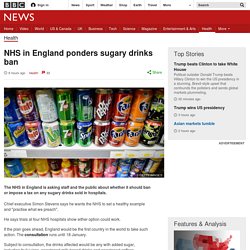
Chief executive Simon Stevens says he wants the NHS to set a healthy example and "practise what we preach". He says trials at four NHS hospitals show either option could work. If the plan goes ahead, England would be the first country in the world to take such action. The consultation runs until 18 January. Subject to consultation, the drinks affected would be any with added sugar, including fruit juices, sweetened milk-based drinks and sweetened coffees. It is expected that a 20% tax on sugary drinks could raise £20m-£40m a year, for example. Proceeds would be ploughed back into patient charities and "health and wellbeing programmes" to keep the NHS's 1.3 million employees fit. Mr Stevens said: "Confronted by rising obesity, type 2 diabetes and child dental decay, it's time for the NHS to practise what we preach. Uld artificial sweeteners make people more hungry?
Image copyright Thinkstock Artificial sweeteners can boost appetite by activating hunger pathways in the body, scientists have found in animals.
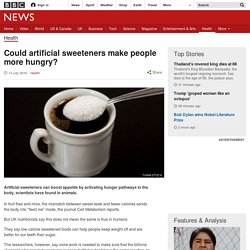
In fruit flies and mice, the mismatch between sweet taste and fewer calories sends the body into "feed me" mode, the journal Cell Metabolism reports. But UK nutritionists say this does not mean the same is true in humans. They say low calorie sweetened foods can help people keep weight off and are better for our teeth than sugar. The researchers, however, say more work is needed to make sure that the billions of people who regularly consume sugar substitutes don't have the same reaction as they saw in their animal tests. Image copyright SPL The Australian team looked at brain signals linked to appetite and pleasure in the insects and rodents, as they restricted what they could eat. Some were given a diet that contained natural sugars while others were fed the same diet plus added low calorie artificial sweetener. Are artificial sweeteners bad for us? Going against the sugar grain: Will the sugar tax spark a new wave of soft drink innovation? George Osborne’s surprise announcement of a sugar tax on soft drinks was one of the more notable inclusions in an all-round controversial budget.
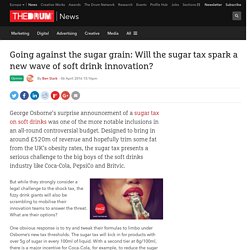
Designed to bring in around £520m of revenue and hopefully trim some fat from the UK’s obesity rates, the sugar tax presents a serious challenge to the big boys of the soft drinks industry like Coca-Cola, PepsiCo and Britvic. But while they strongly consider a legal challenge to the shock tax, the fizzy drink giants will also be scrambling to mobilise their innovation teams to answer the threat.
What are their options? One obvious response is to try and tweak their formulas to limbo under Osborne’s new tax thresholds.
Sweet poison: why sugar is ruining our health. But take heart.
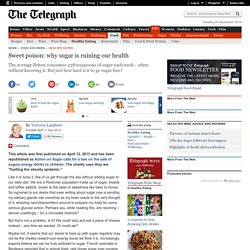
Around the world, a growing body of expert opinion – the 'No Sugar’ movement – is leading a global fightback and warning that our sweet habit is completely out of control, leaving a nasty taste in the mouth of the body public. Sugar, whether added to food by you or the manufacturer, is the greatest threat to human health, bar none, they say.
And unless we wise up and quit en masse, we don’t just risk personal obesity and disease, but national bankruptcy and collapse as the toll our ill health takes on our countries’ economies threatens to destabilise the modern world. The movement is led by Robert Lustig, professor of paediatric endocrinology at University of California, San Francisco, author of Fat Chance: The Bitter Truth About Sugar, numerous scientific and press articles, and presenter of “Sugar: the Bitter Truth”, a YouTube clip viewed more than 3,300,000 times. There is no sugar conspiracy, and a sugar tax still won’t work. The media accuses the sugar industry of a conspiracy to deceive governments into advocating low-fat diets, which after half a century have failed to curb obesity-related diseases.
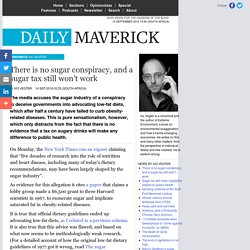
This is pure sensationalism, however, which only distracts from the fact that there is no evidence that a tax on sugary drinks will make any difference to public health. On Monday, the New York Times ran an exposé claiming that “five decades of research into the role of nutrition and heart disease, including many of today’s dietary recommendations, may have been largely shaped by the sugar industry”.
As evidence for this allegation it cites a paper that claims a lobby group made a $6,500 grant to three Harvard scientists in 1967, to exonerate sugar and implicate saturated fat in obesity-related diseases. It is true that official dietary guidelines ended up advocating low-fat diets, as I related in a previous column. This conclusion alone should be enough to sink a sugar tax proposal.
A government clamp-down on sugar would have harmful effects – Institute of Economic Affairs. New IEA research dispels the myth that government intervention in the sugar industry is justified Scant evidence exists to justify government interference in the UK’s food supply.
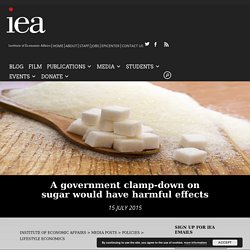
Britons consume less sugar per head today than in 1900 and yet calls for ‘action on sugar’ are more prominent than ever. Sugar tax could sweeten a market failure. Health campaigners and political observers got a surprise in the United Kingdom's latest budget.
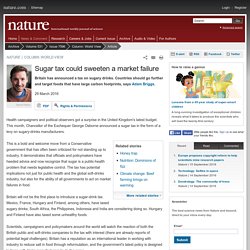
This month, Chancellor of the Exchequer George Osborne announced a sugar tax in the form of a levy on sugary-drinks manufacturers. This is a bold and welcome move from a Conservative government that has often been criticized for not standing up to industry. It demonstrates that officials and policymakers have heeded advice and now recognize that sugar is a public-health problem that needs legislative control. The most worrying aspect of the 'sugar tax' row - MHP. A growing number of people support a “sugar tax”, according to The Times – but that’s not the figure Jeremy Hunt should be most worried about.
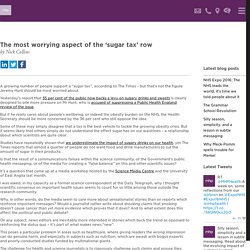
Yesterday’s report that 35 per cent of the public now backs a levy on sugary drinks and sweets is clearly designed to pile more pressure on Mr Hunt, who is accused of suppressing a Public Health England review of the issue. But if he really cares about people’s wellbeing, or indeed the obesity burden on the NHS, the Health Secretary should be more concerned by the 36 per cent who still oppose the idea. Some of these may simply disagree that a tax is the best vehicle to tackle the growing obesity crisis. But it seems likely that others simply do not understand the effect sugar has on our waistlines – a relationship about which scientists are quite clear. Why food and drink taxes don't work. Beverage purchases from stores in Mexico under the excise tax on sugar sweetened beverages: observational study.
M Arantxa Colchero, researcher1, Barry M Popkin, professor2, Juan A Rivera, director3, Shu Wen Ng, associate research professor2Author affiliationsCorrespondence to: S W Ng shuwen@unc.eduAccepted 24 November 2015 Abstract Study question What has been the effect on purchases of beverages from stores in Mexico one year after implementation of the excise tax on sugar sweetened beverages?

Methods In this observational study the authors used data on the purchase of beverages in Mexico from January 2012 to December 2014 from an unbalanced panel of 6253 households providing 205 112 observations in 53 cities with more than 50 000 inhabitants. To test whether the post-tax trend in purchases was significantly different from the pretax trend, the authors used a difference in difference fixed effects model, which adjusts for both macroeconomic variables that can affect the purchase of beverages over time, and pre-existing trends. Introduction Methods. Sugar tax: financially regressive but progressive for health? George Osborne’s best-kept budget secret – a sugar tax on soft drinks – has provoked a war of words between fizzy-drink producers, health experts, economists and thinktankers on the airwaves and on social media.
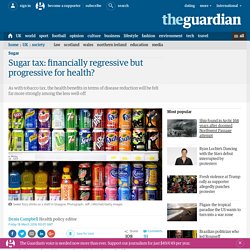
But there is evidence – limited but accumulating – from some of the 15 countries that already have a sugar tax that it reduces consumption of heavily sugared products. Research published in the British Medical Journal in January indicated that Mexico’s introduction of a 10% levy on sugar-sweetened drinks on 1 January 2014 led to a 10% fall in sales by the end of that year. There is no evidence whether this drop in consumption has yet produced a knock-on reduction in diseases including diabetes and obesity, of which Mexico has unusually high levels. But the Mexican government’s hope that the tax will eventually be beneficial to health seems well-founded. The UK's Sugar Tax: Do 'Sin Taxes' Work? As of Chancellor George Osborne’s March 16 budget, the sugar tax is set to return to Britain. This time it will take the form of a sin tax, levied to both discourage and profit from an act purported to be harmful to society.
Osborne and some pro-sugar tax activists hope the move will help reduce obesity––especially childhood obesity––in Britain, and some of the revenues are intended to go toward physical-activity programs for children. Under the plan, by 2018, sugary drinks will be taxed based on the amount of sugar they contain, with some exemptions for fruit juice and milk. The tax might turn into a policy export. ‘Fat taxes’ do work, EU report finds – EurActiv.com. Specific taxes on sugar, salt or fat do cause reductions in consumption, the European Commission found in a new report.
But higher taxes may also merely encourage consumers to go for cheaper products, it warned. The precise impact of such “fat taxes” on the competitiveness of the European agriculture and food sector still needs to be fully assessed, the report added. The study, “Food taxes and their impact on competitiveness in the agri-food sector“, concluded that food taxes “in general achieve a reduction in the consumption of the taxed products”.
Sugar reduction: from evidence into action (Public Health England report) Media coverage. Public Health England's report, Sugar reduction: from evidence into action, media coverage BBC 6 O' clock and 10 O' clock newsBBC news channelChannel 4 newsChannel 5 news Radio Radio 5 LiveBCB Radio Newspaper articles The Sun, 24th OctSunday Telegraph, 25th OctThe Observer, 25th OctDaily Mail, 26th Oct Online. Sugar tax could save millions from obesity. Sugar reduction The evidence for action. Levy on high sugar drinks: PHE statement. Jamie Oliver's sugar tax criticised as people point out the high sugar content of his recipes. However, some were angered by the tax, which won't only hit Fanta and Coca-Cola but gin and tonic.
The recipes for drinks on his website contain vast amounts of sugar. A recipe for 'Holiday citrus slushies' on his site contains 23g of the hated white granules per serving, while another recipe for a 'passion fruit caipirinha' includes 4 tablespoons of brown caster sugar to make just two servings. Photo: jamieoliver.com One recipe promoted on his site calls for gammon to be cooked in four litres of coca-cola.
And it isn't just his drinks recipes which are heaped with sugar - one slice of the 'Children's Party Cake' which is promoted on his site contains 32.5g of sugar, which is three times the daily intake recommended for a child. Photo: jamie oliver/guido fawkes After the tax was announced, angered people trawled his website for sugary recipes. Heston Blumenthal pans Jamie Oliver’s sugar tax as ‘confusing’ Global examples feed arguments for and against sugar tax. Both sides of the sugar-tax debate point to the international experience as a reason for and against the introduction of a levy in Ireland.
With varied policies and success, health strategies around the world have included everything from sugar-sweetened drinks to chocolate, ice-cream and jam. Policy accompanies a growing appreciation of the dangers of sugar consumption, obesity and the kinds of chronic diseases associated with poor diets. But for every argument there is a counter argument and the experience and approach of varying countries differs. The UK’s duel-band policy on sugar-sweetened drinks, announced this week, will target sugar content in products above both 5g and 8g per 100 millilitres and aims to raise about €662 million a year. Pre-policy research by Public Health England found increasing the price of high-sugar products reduced purchase levels proportionate to the tax rate. It found tax-related reductions in sales in Norway, Finland, Hungary and France.
Chronic disease. For sugar tax supporters, 2016 may be the sweet spot. How one of the most obese countries on earth took on the soda giants. Why the government is going sweet on a sugar tax. Sugar intake in children 'double recommended level' Cameron under pressure as public backs sugar tax. David Cameron is facing renewed demands to embrace a sugar tax to tackle Britain’s growing obesity crisis after a new poll found more than half of voters backed the idea. Support for a levy on sugary drinks and food is now running at 53%, according to the findings, shared with the Observer, of a representative sample* of more than 2,000 people.
Budget 2016: Sugar tax on soft drinks announced. Sugar-sweetened beverages coverage in the British media: an analysis of public health advocacy versus pro-industry messaging. Introduction. Sugar-sweetened beverages coverage in the British media: an analysis of public health advocacy versus pro-industry messaging. Do the Criticisms of a Sugar Tax Stack Up? How the media’s language of obesity may have made the sugar tax inevitable. The government’s decision to impose a ‘sugar tax’, announced in the 2016 Budget, should have come as no surprise, writes Dimitrinka Atanasova. Rather it was anticipated based on longer term trends in obesity news reporting – reporting on what has (even) been called a ‘national emergency’. I started studying how British media report on obesity in 2009 when a proposal for holding a European Obesity Day to raise awareness about its health consequences came out.
By 2010, the European Obesity Day was launched and 2011 saw calls by its president to recognise obesity as a chronic disease in Europe – a continent ‘in the grip of an “obesity epidemic”’. Taxing Junk Food to Counter Obesity. Food and beverages taxes final amended. Sugar tax will have negligible impact on public health. Sugar tax survives in 'watered-down' obesity strategy. Sugar tax: Osborne's two-tier levy brings mixed response. George Osborne has responded to the growing clamour for tough action on obesity by announcing plans for a sugary soft drinks tax intended to make children healthier and cut the disease’s £5bn a year cost to the NHS. The levy, which will start in April 2018, will put up the price of drinks such as Red Bull, Capri Sun, Sprite and several versions of cola. The Treasury has not decided exactly how much extra they will force producers to charge for heavily sweetened drinks, but health campaigners want it to be 20%.
Companies that produce or import soft drinks with significant added sugar will have to pay one level of the tax for drinks containing at least 5g of sugar per 100ml and a higher rate for those with more than 8g per 100ml. “Five-year-old children are consuming their body weight in sugar every year. Experts predict that within a generation over half of all boys and 70% of girls could be overweight or obese. 10 reasons why the sugar tax is a terrible idea. Oxera - Leading economic thinking in Oxera's Agenda articles. Sugar Tax Gains Momentum in 2016. Vid 11171 Attitudes. The sweeter alternative to sugar tax - Good Things Magazine. More tax on sugar is not the answer. Sugars in our diet. Is sugar causing the obesity 'epidemic'?
BBC Science - Why is sugar so addictive? Taxpayers' Alliance: Sugar tax will hit poorest hardest. Halt sugar tax introduction, urges food and drink industry. 'Food industry is slowly poisoning us’: Action on Sugar speaks out on research – video. Like tobacco, sugar must be made a pariah. The cafes serving drinks with 25 teaspoons of sugar per cup. Will a sugar tax actually work? Taxes, Inequality and Obesity.
Evidence that a tax on sugar sweetened beverages reduces the obesity rate: a meta-analysis. The potential impact on obesity of a 10% tax on sugar-sweetened beverages in Ireland, an effect assessment modelling study.